Introduction
I was a good friend of the late Roy Smith, a senior construction engineer who oversaw many interesting projects during his career. His work was as varied as building council housing estates in Newcastle-under-Lyme, upgrading mansions for multi-millionaires in Kensington (London) and teaching bricklaying to Tanzanians for the UK Voluntary Service Overseas (VSO).
Writing
Since retirement, Roy found enjoyment in writing. Among the books Roy wrote was “From Oatcakes to Caviar” (downloadable as a PDF).
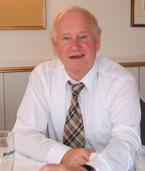
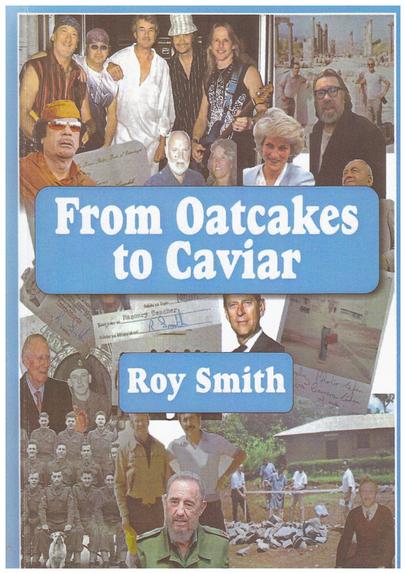
Celebrity Lifestyle 😉
During his fascinating lifetime, Roy met an awful lot of well-known / famous people. I’ve articulated a summary of those encounters below, which I gleaned from conversations.
Stanley Matthews – footballer

Context: Stanley Matthews was handing out awards at a carnival in Knutton, Newcastle-under-Lyme, where Roy was raised. Roy (of school age) was participating in a fancy dress competition, which he duly won. The winner’s prize was given by Matthews, who joked to Roy that he had to be the winner given that he was wearing a red and white striped top – Roy was actually wearing a white T-shirt, which his auntie had painted red stripes onto.
Roy’s words: No matter where I travelled overseas and was asked where I came from, I only had to say the Potteries. People would then say “Stanley Matthews“, everybody knew or had heard of the great man. Many’s the time when I reminisce about him giving me three half crowns in a brown envelope for winning in that carnival. I never had the chance to ask him if he remembered it, to me it was a feeling in my head that I had won the lottery. It was the beginning of my hobby of meeting and talking to people who were well known. It was something I later wrote about, but when I did, some content was taken out by the publisher. He was a ladies’ man and I knew one very attractive lady who became well known in the Potteries.
Oliver Reed – actor
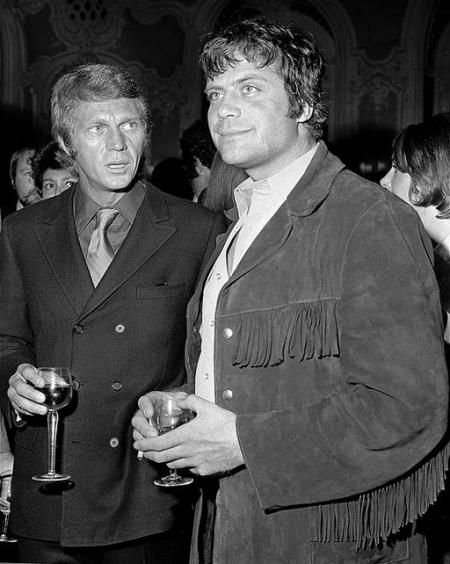
Context: Roy and Oliver Reed did national service together for two years and became close friends. Reed once visited Stoke to audition for a film about the Potteries – he didn’t get the part. During the trip, Roy drove Reed to several potbanks (including Wedgwood and Doultons), as he wanted to buy a brown teapot for his nan.
Roy’s words: My wife didn’t like him, I think she thought he was leading me astray (he was). He thought he was a ladies’ man, but he was too aggressive – that look made many women afraid of him.
I was twenty-one, and getting married a week later to my childhood sweetheart, the reason being that my father would not sign for me to get married before. One of the jokes at my wedding by my best man Graham, was reading a letter from Her Majesty the Queen. She was inviting me to two years in the army, free of charge and to report to Aldershot in two weeks’ time. But it was no joke. One week on honeymoon and then Joyce saw me off to Aldershot from Stoke station. Arriving at Euston station I had to cross over to Waterloo to catch the Aldershot train. When I went down to the underground it was like another world, I didn’t have a clue what to do. There were thousands of people, to my mind. Seeing a ticket man, I asked him directions. He said to get a one shilling ticket and follow the yellow line, which I did. I ended up on a platform with a sign saying Aldershot, plus many other places. A train came in, the doors opened, I got in, and the doors closed, and off we went within seconds. Sitting there looking at the train map, I counted five stations and then mine, but to my surprise it was another station. I panicked and asked the fellow next to me if he could help. “Oh you came to the wrong side of the platform” he said, “you should be going the other way.” Bloody hell, what a to do! I thought “Don’t worry.” He said “You can stay on here all day, going round till you come to your station, it just takes a bit longer this way.” Sure enough, after about twenty minutes the train arrived at Waterloo. Going up a large moving staircase, I arrived at the top to see a large number of entrances with their destinations listed above. At last I came to gate number eight, which said Aldershot. “Thank God”, I thought, “One and a half hours wait.” Whilst waiting, I noticed a lot of other lads about my age with their cases, so I guessed we were all going to the same place, i.e the ‘Army’.
I met up with a smart, straight-backed fellow with a cockney accent. “Are you going for National Service?” I said. “Yes, Queen Elizabeth Barracks.” He said, “Royal Army Medical Corps, by the way, my name’s Ollie, Ollie Reed”, he said. “And mine is Roy” I replied. At Aldershot, we both got off, and a soldier was shouting, “Anyone for Queen Elizabeth, jump on this lorry”, which we did with a number of others. About twenty minutes later we arrived at the camp. “Get in line at that door and enter when called by the sergeant who will take all your particulars”, another soldier bellowed at us. Ollie was in front of me as we were going through, then he heard the sergeant keep saying “How do you spell this?” Ollie turned to me and said: “They can’t bleedin’ spell, we’ll have some fun here.”
Ollie was next, the sergeant shouted, “Name?” Ollie spelt it out for him. The sergeant looked up at him and if looks could kill, Ollie was a dead man. “Occupation?” “Playboy” said Ollie. “Bloody playboy? What’s that?” “It’s a kind of actor sarge”, said Ollie, laughing, but with no sound coming out of his mouth. “You’ll be a shitting actor by the time I’ve finished with you lad” said the sergeant. “Next”, the sergeant shouted. “The name’s Roy Smith …S.M.I.T.H” I said. “You being bloody funny lad?” the sergeant screamed. Ollie nearly fell over. I thought that if I stayed with this fellow I was going to get into trouble, but when we got into the barracks room his bed was next to mine. Oh dear I thought, that’s all I need. Looking back, it was the most enjoyable two years of my life. Ollie became my best mate and I’d like to think I was his. I went through training and attended many courses like first aid. I attended the intelligence course with Ollie, why was beyond belief, but later it became very useful to me. The two years soon went, getting into trouble then getting out of trouble seemed to come natural to Ollie.
Ollie would join any courses going, one day he came to me with forms to be an officer. “You must be joking, a commissioned officer? No way” I said. “Will you help me to fill in this form”, he said? “Yes”, I replied, and it was then that I realised Ollie had difficulty in reading and writing. We would now call it dyslexia. Ollie was away for about a couple of months, when he came back he had three stripes.
It was about this time we began to drift apart. I was into sport and Ollie was with fellows who liked acting and was always putting on shows in the NAAFI. There was only one event I joined in, the Black and White Minstrel Show. I had done this at school, and like an idiot had once told Ollie. Ollie was brilliant.
About a couple of years later, Ollie rang me to say he was coming to the Potteries to look around. He wanted to see Burslem and the other towns, as he was reading Clayhanger, and hoping to get a part in the film of that name. He also wanted to visit Wedgwood and Doulton and to get a brown teapot for his Grandparents from a company named Sadlers. I told him I would pick him up at Stoke Station. He arrived on the Wednesday at 10.30 and after his usual greeting he told me he had not passed his driving test.
We went to Burslem, and he bought a figure from their shop in Nile Street, then we went over to Sadlers. I knew Peter Sadler as I had done some building work there. Peter showed us around, showing us all the beautiful teapots, but Ollie said that his gran wanted a brown one. These happened to be the cheapest, but I don’t think this had anything to do with it, as it was what his Gran wanted. I drove him to the Wedgwood shop, he bought a few items in blue and white China. I drove him through all the six towns, he said he had never seen anything like it, he said it was like being in another world. He kept on about the toilets being outside. He said one thing that would get me the part would be talking like me, like a Quaker, with thee and thou and wut. We had a meal and a couple of pints in the North Stafford Hotel opposite the station, then he caught the 6pm train and he made me promise to call on him in London at any time.
Gordon Banks – footballer
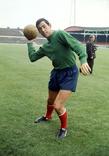
Context: Gordon Banks had bought a house of which which Roy was overseeing the building.
Roy’s words: While working on a building site at Ashley / Loggerheads for Mark Coupe Builders, I had the pleasure of meeting Gordon Banks and his wife Ursula. He had just signed for Stoke City, they’d bought one of the houses we had built. Knowing he had been a bricklayer, I shouted to him that I was keeping his trowel warm. To my surprise, he climbed up the scaffold, took my trowel and started laying bricks. From then on, he became one of my ‘Ordinary heroes’ and I’ve followed his wonderful career with admiration ever since. I was upset that he was never knighted, as Geoff Hurst who also lived in that area did so. When Geoff was looking for a change of home, I advised him to look at some houses in Madeley. He liked one in the area and bought it, that’s how he came to live there. What a shock to hear Banks had died, my sincere condolences go to Ursula and her children. R.I.P.
Roger Bannister – first sub four minute mile athlete
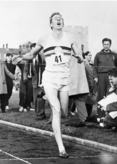
Context: Captain Roger Bannister was at Aldershot while Roy was doing his National Service.
Roy’s words: When he arrived at Crookham [RAMC headquarters] we thought we would test his stamina, so we marched up and down the drill square for days, but in the end we were all knackered and he wanted to carry on! I thought “bugger this” for a game of soldiers. He was my CO for twelve months, then he volunteered to go overseas to Cyprus.
I called you “Sir!” in 1957, before you were knighted. Two years doing national service in the Royal Army Medical Corp at the training headquarters of the Queen Elizabeth barracks, Crookham, Aldershot. A person like you, famous for the ‘sub-four-minute mile’, doing national service, was an inspiration to us lesser mortals – especially me, who had been very angry at our class system. Being on the “drill staff”, we took great delight in marching you up and down that square, practically every day for a month, trying to exhaust you in your squad. Some found it murder but you never did, in fact, you broke me –which was rather embarrassing.
The reason we called you Sir was that you had graduated to being a doctor (at around twenty-seven) and entitled to a commission, but you nevertheless entered the army as a lieutenant. Because of your qualifications and super-fitness, you soon earned promotion to captain. I doubt whether you would remember me (I was the horrible drill sergeant), but I will always remember you. It was great to have known you, if only for a short while, Sir. I would like to think that if you remember me it will be as that bastard: Sergeant Smith, but knowing your gentlemanly qualities and mildness you would do no such thing.
Field Marshall Montgomery – commander of the British army in World War II
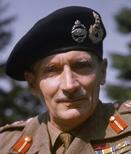
Context: While Roy was on National Service, Bernard Montgomery was involved. On one occasion during a train journey together from Aldershot to Waterloo, Montgomery spoke to Roy as “Woy” – he had a lisp.
Roy’s words: In my book I didn’t write too much about his speech – not pronouncing his R’s properly, the powers that be [publishers] thought it may be offensive to him. “Woy, comes from America after Woy Wogers the cowboy” he once said of my name. He told me that his actual name is Bernard, and said it meant brave and kind natured, like a St Bernards dog. He seemed to know a lot about the meaning of names and words, perhaps that was his hobby.
On Saturday morning we managed to get a lift in the camp lorry which dropped us off at Fleet railway station, which was the nearest to our base, around three miles away. The next station was Aldershot, but Ollie [Reed] said we’d be better off at Fleet because at Aldershot we would spend all our time saluting bloody officers. After ten minutes the train arrived and there was a rush for a seat. We walked quickly along the corridors looking into every compartment until we came to two men who were looking into one of the compartments that contained only one man, we brushed them aside and rushed in. “Come in boys sit yourselves down I see you are in the medics”, said the little man sitting in the corner by the window. I looked at this man, he was slim, with a very sharp featured face, long slim nose and ferret like eyes that were looking all over us. “How do you like the army?” he said looking at me. I was getting worried. “I know of this man, so be careful what you say Roy”, I thought. “Well, it gets you fit, I’ve never felt so healthy. This is our first pass and we are going to London for the night.” The man then asked what I did before I went into the army. I told him that I was a bricklayer and I had just served my apprenticeship, I’d had only two weeks on full money. He then asked me my name: “Smith, Roy Smith Sir”, I said. “Ah Woy, do you know where that name comes from Woy?” Then it hit me straightaway. I knew this man, I had heard him talking many times on the radio and television. He had a problem pronouncing his R’s, it was field marshall Montgomery. “No Sir, I don’t” I said. He told me that in the first world war a lot of American’s helped us, and some had the Christian name Roy, the most famous being Roy Rogers the cowboy. He told me that my father must have liked cowboy films, we all laughed.
He never stopped talking to us all the way to Waterloo. The lads could not understand me calling him Sir all the time. We walked along the platform at Waterloo. I told the lads who this man was, as he now had two men with him – one on each side of him. I told the lads it was Montgomery and we all came to attention as he passed us, he looked at us with a smile on his face. He stopped in front of me and said “You are quite an alert fellow Woy, with good alertness and observation you will make a good soldier.” I thanked him and he carried on along the platform to be met by two red capped sergeants.
I saw him many times, but never had the pleasure to speak to him again. He lived in the next village, Fareham. He would walk to do some shopping and visit the Post Office, but there were always reporters and photographers following him, as were the two men who I had brushed aside in the corridor on the train. He was very talkative and always asking questions. I’m reminded of my macho answer to him about being in the medics. I thought that being a nurse, running about the ward with a bed pan or on the battlefield carrying a stretcher was not me. “Well Woy, why did you join the medics?” he asked. I told him I was playing football at the time and was told by the club to volunteer for the medics, as they had an agreement with them saying that if I played for the army on Wednesdays I would get a weekend pass, enabling me to go home and play for the club. Monty replied: “You know it is very important being a medic, don’t feel out of the action because the first thing a soldier shouts when wounded is ‘medic’. When bullets and bombs are going off all around it takes a lot of courage to go to him with only a first aid kit, there are more medals given to these soldiers although it is only a small regiment.” I had never thought of it that way, but I told him I thought I would still prefer a rifle to a first aid kit. He told me that I would have to volunteer to join another regiment. He also said he was a socialist and was delighted when they got elected to run the country. I did not pay much attention to this, although I was a little surprised as I thought he would have been a Conservative. It was later that I realised he, and many more in the army, had voted against Churchill because he was Conservative.
After my two years of national service I returned to Staffordshire. I moved into a council flat and life returned to normal, only talking on the phone to Ollie reminded me of the army. One of my duties was to supervise the sergeant’s mess. One day the menu contained brown stew and dumplings, to me this was the Potteries “Lobby and Barmy Balls”. When asked by the RSM what was on the menu, I loudly said the latter.
Idi Amin – Ugandan leader
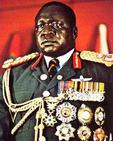
Context: Roy met Idi Amin when he was in the Royal medical corps in Crookham, where Amin was also stationed and took part in boxing activities. Roy later saw Amin in Tripoli, at the time when Amin was president of Uganda. After they’d met, Amin recalled Roy and told him that he would look after him.
Roy’s words: One time the Regimental Sergeant Major called me to tell me about another RSM (Idi Amin – later to become president of Uganda), who would be staying at the mess and everybody, especially me, must see that he gets looked after. “He’s here for about four to six weeks and he is boxing for the commonwealth”, said the RSM. His name was RSM Amin, a six foot African weighing about twenty-six stone. He was very pleasant, no problem at all. I found it difficult to have a conversation with him and I always asked him if he wanted to do this and that. I suppose years later, people had wished I had put a cyanide tablet in his morning coffee.
I never thought he would turn out like he did, although his build and stern looks did frighten a lot of people. In Libya, I would avoid him like the plague, although he was always nice to me. I was always uncomfortable in his company.
Fidel Castro – Cuban leader
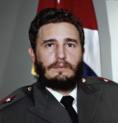
Context: Fidel Castro greeted Roy after alighting an aeroplane to Cuba he’d been seconded onto, which was full of severely injured Cuban soldiers from war in Ethiopia. On a later visit to a building Roy had overseen, Castro shook Roy’s hand and asked him how he was finding Cuba. They met several more times.
Roy’s words: Still our media gives a dislike to him, which I don’t know [disagree with]. He’s been dead for quite a while now. I feel as though I didn’t give him enough information in my book, perhaps the pressure people putting on me made me afraid. I regret it, as I think he did his best, given that he had the Americans and the UK against him, in my estimation he did very well.
The first time I met him was outside Havana Airport, after a terrible few days and a flight from Madrid. Walking out through the double doors I was hit first by heat and humidity then the shock of hundreds of Cubans crying and shouting. The noise was horrific, then all of a sudden I saw a large man with a black beard wearing army camouflage denims and a black berry on his head. He was hugging all the wounded soldiers I had travelled with on the plane who had returned from Angola. As he hugged and kissed them, there were tears in his eyes, he was crying. This was strange to me, as I had believed him to be a monster, dictator, traitor and rebel. How could this be? I was used to these ceremonies of people with gloves on shaking hands. After a few minutes standing there in shock, I watched solders get into the back of army lorries with help. With amazement, Fidel got in with them. What a man, no large limos for him. The next time I saw him was at the opening of the factory that we had constructed. Although I had seen him many times walking around, other than a nod of acknowledgement or the raising of his hand, I had never spoke to him.
There’s a law in Cuba that you work six days for yourself, the seventh is for Cuba where everyone is out doing something or other for their country. On this particular seventh, we were asked to check the factory to make sure everything was shipshape and clean as Fidel was coming to open it. This we did, I checked the water, the electric, the water treatment plant. I especially checked the freezing section, where I noticed a number of girls sweeping and mopping the floors. To my amazement, there was the man himself, Fidel with a mop. “This is a mirage”, I remember thinking when he shouted for me to carry on and waved me through, which I nervously did. I remember reading how the Americans had tried to kill him many times and I now realise why they had failed. It would have been quite easy for me to kill him, but it would be like committing suicide. The people would have ripped me apart, there would be no court trial for me. The next day we all lined up ready for Fidel, and I smiled thinking if the place is untidy, it’s his fault. Who would believe this, not the Americans or the British. During the time I worked in Cuba, I became to admire Fidel. You cannot be the head of any country for as long as he has and be so loved. All other countries, apart from the above mentioned, have reached the same conclusion as me. I have noticed tourists are beginning to holiday in Cuba now. Good, I’m very pleased and proud to have known him and worked with his people. They have earned our respect to stand up to big powerful countries, it is to be admired. Fidel will be known in history, perhaps not in ours, as a statesman like Gandhi or Mandela.
Alberto Juantorena – 1976 Olympic Games 400m & 800m gold medal winner

Context: They met on a plane in Cuba from Havana to Santiago. They chatted about Roger Bannister, who Juantorena joked ran a little too far.
Roy’s words: I met Alberto Juantorena on the plane to Santiago, he told me he lived a few doors away from the attorney, in a house which Fidel gave him for winning medals in the Olympics. After that meeting, we became friends and I made efforts to wave as I passed his house. Many times he asked me to get things for his family from the diplomat’s shop, as only people with passes were allowed in. There were very few shops, in every area there was one where you’d go for your rations every week (free of charge), instead you had work vouchers which could be exchanged for rations.
Colonel Gadaffi – Libyan leader

Context: They met at a military aircraft hangar, where Gadaffi was giving a speech. Roy recalled that his eyes were like those of sharks – round and black, like two beads with no white around them. Roy oversaw the construction of six airports in Libya, all in desert environments.
Roy’s words: A hypocrite, he always wanted to have UK workers on projects as he said they were the best (behind closed doors). Outside, on the stage in the green square where he always gave his speeches, he said we were the US’ lackeys, always running us down. The ugly man with the make-up on his face. Though at meeting on the construction sites he always treated me well, he was definitely a schizophrenic.
Upon completing the construction of one of the airports, Roy was given a flight in a Russian MiG military aircraft, where he was amazed at how quickly the plane reached the Mediterranean Sea given that the airport was near the Chad border. After construction of a further airport, Roy was given a flight on a French Dassault Mirage military aircraft.
Mohammed Al-Fayed – owned Harrods & father of Dodi Al-Fayed
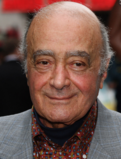
Context: Roy was taken to Harrods to buy furnishings by the owner of a property in St Johns Wood in London, where Roy was overseeing renovation work. Al-Fayed didn’t own Harrods at this time, but was on its board of directors. Al-Fayed was a member of an Arab cartel which was buying London properties, which Roy was did much work for.
Roy’s words: He was one of the Arab cartel buying property in London with my boss, Sourfraki Matoum and others. When they bought Harrods, there was such outrage and the powers wanted to know where he got the money to buy it. The answer was right under their noses, but of course, no evidence. Apart from being the owner of Harrods, Fayed was a very quiet man and did not come to much notice to the media. It was only when his son was attracted to Diana that he became noticed. He was saying that the Royal Family was against their friendship, being a Muslim didn’t go down well.
Ava Gardner & Ingrid Bergman – actresses

Context: Ava Gardner lived next door to the St. Johns Wood property in London which Roy was working on. She would often pop around and say things like “What are you up to Roy? There’s lots of dust.” Ingrid Bergman lived near to her friend Ava Gardner, she’d sometimes pop around with her to have a cup of tea with Roy.
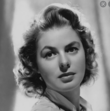
Roy’s words: I had just been watching The Barefoot Contessa film on the TV and there was Ava Gardner. She certainly was a very beautiful lady, when Sourfraki [the agent Roy worked for] brought her to look around the house. I knew her straightaway, but the men had no idea who it was. She’d been married to Frank Sinatra and they didn’t know her, unbelievable. From time to time, she called with Ingrid Bergman, as she lived next door in St. Johns Wood.
Princess Diana – Lady Diana
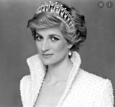
Context: While Roy was working in Nevis St Kitts for the Voluntary Service Overseas (VSO), Lady Diana was introduced to Roy and told him she admired the work he was doing.
Roy’s words: I got in trouble at a beach barbecue after I took a photo of her swimming, two men grappled me and took my camera off me. Later my camera was returned and told that the princess had said it was OK.
Prince Phillip – Duke of Edinburgh
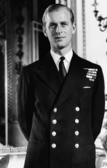
Context: Roy met the prince twice, the first time while doing VSO work in Tanzania and the second time doing VSO work in the Caribbean.
Roy’s words: I was asked by Prince Philip “Didn’t I see you this morning in Nevis?” I replied “Yes, you did. I’m amazed you can remember.” Prince Philip then joked “Of course I remember you, you were the only white face among 400 black children.” He then asked me what I most missed about home, to which I answered “proper beer”; someone else in the group mentioned “pork pies.” I was invited onto the Royal yacht Britannia for cocktails that evening, where I received a pint of English beer and a pork pie.
I’m not a royalist, but must admit I was very impressed meeting him. One of my proudest days was meeting him on the island of St Kitts & Nevis.
Ricky Tomlinson – actor
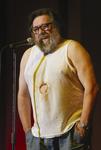
Context: Roy was overseeing construction work in Staffordshire, while a national builder’s strike was underway. Ricky Tomlinson was a union representative who came down from Liverpool with some striking builders who shouted “scab” at Roy and his colleagues. At one point Ricky Tomlinson shouted up a ladder to Roy “Hey you, you hairy-arsed bricklayer.”
Roy’s words: I never thanked him for calling me a hairy-arsed bricklayer, as it seemed to become well known, especially in the construction trade or to people who read my books. When you see him on the television [as Jim Royle], that’s really him. He was untidy, long haired, hippy and crude, you could not have picked a better man for that character. After union protesting in S-O-T, he went to Shrewsbury, where he was arrested and jailed in 1973.
Fanny Deakin – health care advocate & political activist
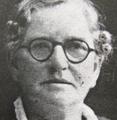
Context: Fanny Deakin was the midwife during the birth of Roy’s first daughter.
Roy’s words: Fanny Deakin was the name of the hospital where my first daughter was born. I never had the pleasure of meeting her, but have talked to many women who had their babies born there, they all praised her. My mother and grandmother both said she was a wonderful lady and that she had helped them. But – there’s always a but, she was a communist, which reminds me of being in Cuba when a young fellow spat on me and called me a capitalist pig. I stood there in shock – me a capitalist pig, a hairy arsed bricklayer. I did not have two shillings to rub together. I never called people names since.
Sir Garfield Sobers – cricketer
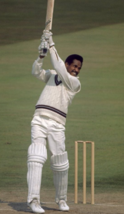
Context: Tommy Talbot was a businessman in the Potteries, who persuaded Garfield Sobers to come to England to play in the Potteries.
Roy’s words: During a break from work, I attended a cricket match in Antigua in 2004 where I watched Brian Lara score 400 not out against England. Garfield Sobers was sat nearby in the stand, I met him after being introduced by Tommy Talbot. After Sobers retired from international cricket, he played for Norton [Stoke-on-Trent] in the North Staffordshire and South Cheshire league.
Deep Purple – rock band

Context: The Deep Purple Band members were neighbours of a property Roy was working on in Shiplake, near Reading. They jokingly came to ask for jobs, Roy flippantly declined them because he disapproved of their long hair.
Roy’s words: I didn’t know them, I thought they were looking for work and told one of them men to tell them to “piss off”. I never lived that down, the men always greeted me, even today, with “piss off.” Lady Grade always asked me if I could stop them making such a noise, as she lived the other side.
The following individuals were recruited by the VSO to publicise its activities, which is how Roy came across them.
David Essex – singer
The young ones loved David Essex’s music and songs. He was a good footballer, when he was representing the VSO in Uganda I played on the same team as him.
Fatima Whitbread – athlete
I met Fatima Whitbread while she was working for the VSO in Kenya, she had muscles which put me to shame.
Richard Wilson – actor
Richard Wilson – ‘Grumpy Rick‘ – not so. He was certainly the life and soul of the VSO in the West Indies.
Lord Carrington – UK foreign secretary
Lord Carrington was OK, but was I uncomfortable in his presence. There was no way I was going to call him “My Lord”; otherwise, he gave good speeches in Mozambique.
